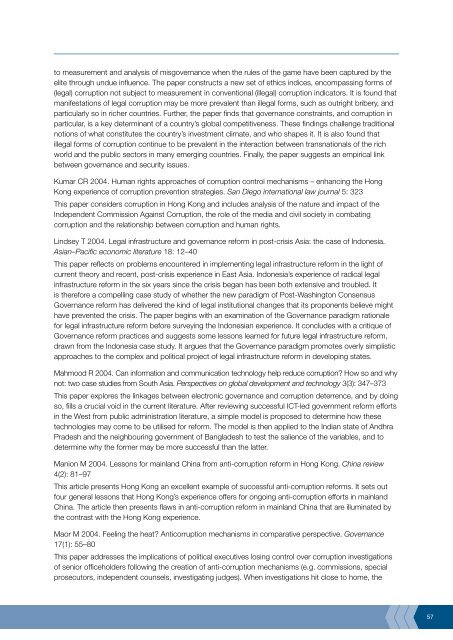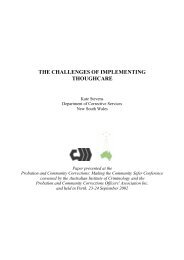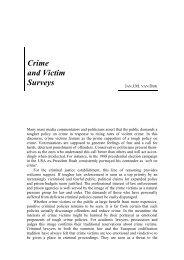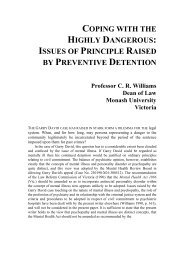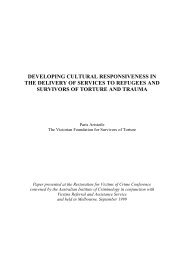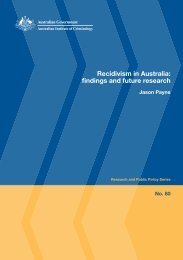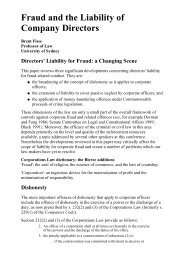Review of anti-corruption strategies Rob McCusker - Australian ...
Review of anti-corruption strategies Rob McCusker - Australian ...
Review of anti-corruption strategies Rob McCusker - Australian ...
You also want an ePaper? Increase the reach of your titles
YUMPU automatically turns print PDFs into web optimized ePapers that Google loves.
to measurement and analysis <strong>of</strong> misgovernance when the rules <strong>of</strong> the game have been captured by the<br />
elite through undue influence. The paper constructs a new set <strong>of</strong> ethics indices, encompassing forms <strong>of</strong><br />
(legal) <strong>corruption</strong> not subject to measurement in conventional (illegal) <strong>corruption</strong> indicators. It is found that<br />
manifestations <strong>of</strong> legal <strong>corruption</strong> may be more prevalent than illegal forms, such as outright bribery, and<br />
particularly so in richer countries. Further, the paper finds that governance constraints, and <strong>corruption</strong> in<br />
particular, is a key determinant <strong>of</strong> a country’s global competitiveness. These findings challenge traditional<br />
notions <strong>of</strong> what constitutes the country’s investment climate, and who shapes it. It is also found that<br />
illegal forms <strong>of</strong> <strong>corruption</strong> continue to be prevalent in the interaction between transnationals <strong>of</strong> the rich<br />
world and the public sectors in many emerging countries. Finally, the paper suggests an empirical link<br />
between governance and security issues.<br />
Kumar CR 2004. Human rights approaches <strong>of</strong> <strong>corruption</strong> control mechanisms – enhancing the Hong<br />
Kong experience <strong>of</strong> <strong>corruption</strong> prevention <strong>strategies</strong>. San Diego international law journal 5: 323<br />
This paper considers <strong>corruption</strong> in Hong Kong and includes analysis <strong>of</strong> the nature and impact <strong>of</strong> the<br />
Independent Commission Against Corruption, the role <strong>of</strong> the media and civil society in combating<br />
<strong>corruption</strong> and the relationship between <strong>corruption</strong> and human rights.<br />
Lindsey T 2004. Legal infrastructure and governance reform in post-crisis Asia: the case <strong>of</strong> Indonesia.<br />
Asian–Pacific economic literature 18: 12–40<br />
This paper reflects on problems encountered in implementing legal infrastructure reform in the light <strong>of</strong><br />
current theory and recent, post-crisis experience in East Asia. Indonesia’s experience <strong>of</strong> radical legal<br />
infrastructure reform in the six years since the crisis began has been both extensive and troubled. It<br />
is therefore a compelling case study <strong>of</strong> whether the new paradigm <strong>of</strong> Post-Washington Consensus<br />
Governance reform has delivered the kind <strong>of</strong> legal institutional changes that its proponents believe might<br />
have prevented the crisis. The paper begins with an examination <strong>of</strong> the Governance paradigm rationale<br />
for legal infrastructure reform before surveying the Indonesian experience. It concludes with a critique <strong>of</strong><br />
Governance reform practices and suggests some lessons learned for future legal infrastructure reform,<br />
drawn from the Indonesia case study. It argues that the Governance paradigm promotes overly simplistic<br />
approaches to the complex and political project <strong>of</strong> legal infrastructure reform in developing states.<br />
Mahmood R 2004. Can information and communication technology help reduce <strong>corruption</strong>? How so and why<br />
not: two case studies from South Asia. Perspectives on global development and technology 3(3): 347–373<br />
This paper explores the linkages between electronic governance and <strong>corruption</strong> deterrence, and by doing<br />
so, fills a crucial void in the current literature. After reviewing successful ICT-led government reform efforts<br />
in the West from public administration literature, a simple model is proposed to determine how these<br />
technologies may come to be utilised for reform. The model is then applied to the Indian state <strong>of</strong> Andhra<br />
Pradesh and the neighbouring government <strong>of</strong> Bangladesh to test the salience <strong>of</strong> the variables, and to<br />
determine why the former may be more successful than the latter.<br />
Manion M 2004. Lessons for mainland China from <strong>anti</strong>-<strong>corruption</strong> reform in Hong Kong. China review<br />
4(2): 81–97<br />
This article presents Hong Kong an excellent example <strong>of</strong> successful <strong>anti</strong>-<strong>corruption</strong> reforms. It sets out<br />
four general lessons that Hong Kong’s experience <strong>of</strong>fers for ongoing <strong>anti</strong>-<strong>corruption</strong> efforts in mainland<br />
China. The article then presents flaws in <strong>anti</strong>-<strong>corruption</strong> reform in mainland China that are illuminated by<br />
the contrast with the Hong Kong experience.<br />
Maor M 2004. Feeling the heat? Anti<strong>corruption</strong> mechanisms in comparative perspective. Governance<br />
17(1): 55–80<br />
This paper addresses the implications <strong>of</strong> political executives losing control over <strong>corruption</strong> investigations<br />
<strong>of</strong> senior <strong>of</strong>ficeholders following the creation <strong>of</strong> <strong>anti</strong>-<strong>corruption</strong> mechanisms (e.g. commissions, special<br />
prosecutors, independent counsels, investigating judges). When investigations hit close to home, the


